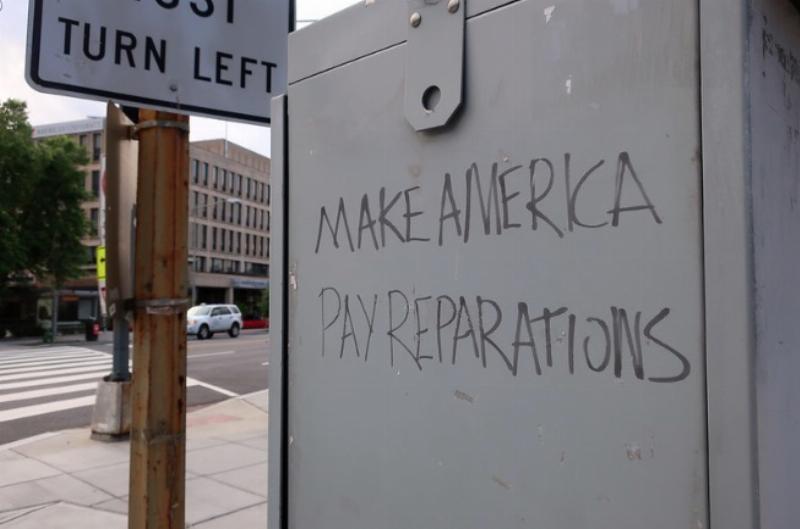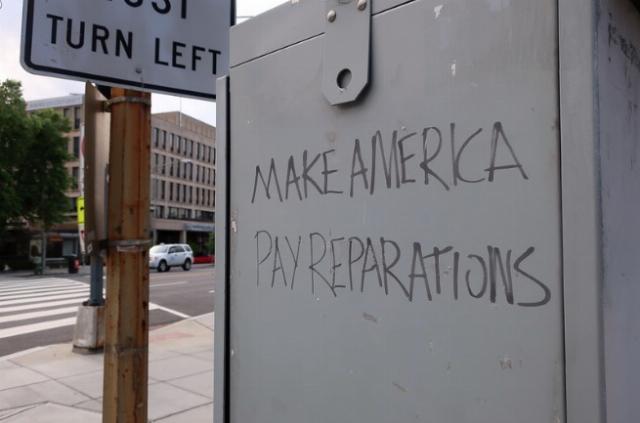


The effort to get American taxpayers to pay African Americans reparations to atone for slavery in America has been around for many years. The premise for these efforts is a belief that descendants of slaves deserve reparations to compensate them for the harms of slavery their ancestors endured, and the residual discrimination they experience to this day. Is this really a good thing, or simply woke posturing that stokes race division and seeks to bankrupt America? How do you establish eligibility? What will it cost? There are more questions than answers.
One of the earliest references to reparations found in the Congressional record is a bill (H.R. 3745) introduced by Rep. John Conyers, Jr. (D MI-1) in the 101st Congress (1989 – 1990):
H.R.3745 - To acknowledge the fundamental injustice, cruelty, brutality, and inhumanity of slavery in the United States and the 13 American colonies between 1619 and 1865 and to establish a commission to examine the institution of slavery, subsequent de jure and de facto racial and economic discrimination against African Americans, and the impact of these forces on living African Americans, to make recommendations to the Congress on appropriate remedies, and for other purposes.
This did not pass, but Rep. Conyers did not give up. During his lengthy tenure, he introduced this Bill many times, up until the 115th Congress, the last he served in.

In the current 119th Congress, the mantle has been taken up by Senator Cory Booker (D NJ), who proposed S.40: [A] Commission to Study and Develop Reparation Proposals for African Americans Act.
In May 2025, Rep. Summer L. Lee (D PA-12) proposed H.Res.414: Recognizing that the United States has a moral and legal obligation to provide reparations for the crime of enslavement of Africans and its lasting harm on the lives of millions of Black people in the United States.
Within this resolution, Congresswoman Lee provides numerous citations to justify reparations. She has been very creative in that effort, often making questionable claims. For instance, she claims that the United States was founded based on black plunder. That inflammatory statement is clearly not historically accurate, but it does reflect the mindset of reparations’ supporters.
While none of these federal efforts have been successful, one state did form a commission to study reparations. California Governor Gavin Newsom signed AB-3121 authorizing a Task Force to Study and Develop Reparation Proposals for African Americans into law in September 2020, and, on June 29, 2023, the Task Force issued its final report to the California Legislature.
The task force estimated that implementing its recommendations could cost the state (which never had slaves) approximately $800 billion. Gov. Newsom responded to the task force’s recommendations by saying that dealing with the legacy of slavery was about much more than cash payments.
Although Gov. Newsom signed a bill in September 2024 that included a formal state apology for slavery and related harms, he vetoed other significant reparations bills and largely disregarded the Task Force’s recommendations. Obviously, as any reasonable person would, Gov. Newsom balked at the price tag.
Determining the cost of proposed reparations is a complex issue. No one approach has been agreed upon. There are differences in the methods used to determine eligibility and in the techniques used to determine compensation.
Originally, the intent was to compensate only those blacks who could trace their lineage to a slave. Perhaps recognizing the difficulty and expense this would entail, most proponents now favor reparations for all blacks.
As a result of these and other differences, the cost estimates vary widely. On the high end, the National African American Reparations Commission (NAARC) says the U.S. owes $26 trillion for its participation in what they call Transatlantic Chattel Slavery. On the low end, William Darity, an economist and professor at Duke University’s Sanford School of Public Policy, calculated a reparations bill of $7.95 trillion. Whatever the cost may be, even if one assumes solely for the sake of argument that reparations are a reasonable policy, they do not seem feasible now or in the future, given the U.S.’s current budget deficits and growing debt.
Regrettably, it’s unlikely that the issue of reparations will go away anytime soon. It’s too valuable a talking point for race baiters and pandering politicians. Revered economist Thomas Sowell said of reparations,
[T]he demand for reparations may seem like an exercise in futility. However, seen as a source of a lasting unmet grievance, it is a stroke of genius to keep blacks separated from other Americans and an aggrieved constituency to support black “leaders” in politics, organizations and movements.
Proponents also ignore the fact that we do have a “reparations” program of sorts. Although not exclusively for blacks, it’s targeted to those in need and offers food and housing assistance, childcare credits, health care, and more. These programs provide an efficient and equitable process for helping blacks in need. Over the decades that these programs have been in effect, blacks have been the beneficiaries of trillions of dollars in benefits.
Taking money from individuals who have never owned slaves and awarding it to individuals who have never been slaves is peak Leftist insanity and wildly discriminatory. The bottom line is it’s simply woke posturing that stokes race division, but even though it’s unrealistic and unlikely ever to happen, the effort will persist.
